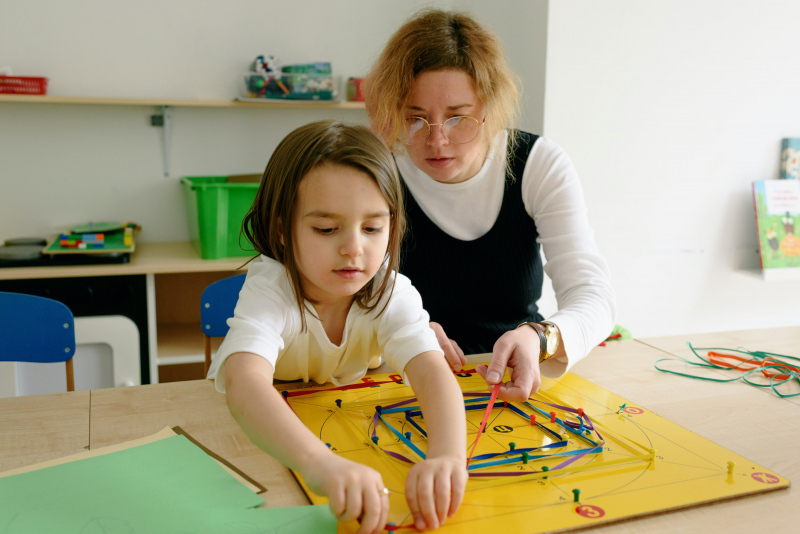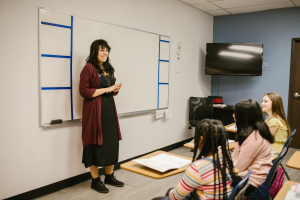Top 11 Most Asked Daycare Interview Questions and Answers
The interview procedure for a daycare worker involves special questions not present in a standard employment interview. You can get ready for your next job ... read more...interview in an early childhood setting by reviewing these childcare interview questions. And the sample responses will demonstrate why you would make a wonderful childcare center staff. Here are some of the Most Asked Daycare Interview Questions and Answers that you should know if you are seeking a career in early childhood education.
-
Common opening statements like "Tell me about yourself" are used to ease both the interviewer and you into the conversation. It enables the interviewer to gain an overview of your past and expertise, giving them knowledge of the abilities and experience you believe are most pertinent to the position you're looking for.
Some interviewers may use your response to this question as an icebreaker to start a casual chat with you in order to learn more about you. In contrast, others may move directly into other interview questions after you respond. Your response should be succinct, but it should also describe what makes you special. You could mention your interests, volunteer work, and upbringing.
Example:
I am an early childcare professional with several years of experience in the care of children and providing early education. Children need to be cared for carefully, to live in love and to enjoy an education from a very young age. Playful and hyperactive children need a patient and responsible caregiver. And I'm confident I can do it. My own childhood experiences have taught me the importance of a nurturing, loving environment. Not all children grow up in loving homes, but I can guarantee that every child in my care has a secure environment and supportive love while they are in my care.

Image by Naomi Shi via pexels.com 
Image by cottonbro studio via pexels.com -
The hiring manager may ask you this interview question to find out whether you truly enjoy the position and are not just looking for a job because caring for youngsters typically requires a lot of patience. In order to effectively respond to this question, show your love for kids and your desire to have a positive influence on their life. Candidates that exhibit compassion, gentleness, and kindness while simultaneously being firm and detail-oriented are typically preferred by hiring supervisors. This can be seen as one of the Most Asked Daycare Interview Questions and Answers.
Example:
I've wanted to work with kids since since I volunteered for a program that gives kids a variety of educational activities. I took care of the children during that time, fed them, slept with them, played with them, and we laughed together every day. And I realized I was really happy to see their smiling faces. I adore kids, and it makes me so happy to watch them develop while in my care.I believe I can be a positive influence on them and help them learn in a way that is appropriate for their age. I am sure I can accomplish it, and it will help them grow in the right direction.

Image by Alexander Grey via pexels.com 
Image by Lina Kivaka via pexels.com -
It's crucial to demonstrate to the interviewers that you don't wear pink spectacles and that being a child carer is not going to be simple. Undoubtedly, this is a fantastic job, but working in a daycare facility is never without its difficulties. You ought to approach them realistically.
In your response, you can mention a number of difficulties. One of these obstacles is dealing with a spoiled child who won't follow your instructions, won't participate in the activities, and might even disrupt other kids in the classroom. The ability to stay upbeat, loving, and creative in the classroom even at trying times in your personal life or just terrible days is another hurdle. And nobody can totally escape such days.
Try to be honest while discussing the difficulties your new work brings. You are aware of them, you'll make every effort to get past them, and you also hope to receive some assistance and support from your coworkers at the childcare facility or from the facility's director.
Example:
Taking care of kids in this age bracket keeps me on my toes. Also, this is the age when many daycare centers start to see behavioral problems and learning difficulties. I worked with a child who had a learning problem in my prior position. I tried to spend more time with them after each lesson to aid in their learning. I would pay close attention to the child and offer guidance as necessary while the other youngsters worked on their allotted duties. Even though some days were challenging, others were incredibly rewarding once they fully grasped the learning task.
Image by Lina Kivaka via pexels.com 
Image by Edward Eyer via pexels.com -
The purpose of this interview question is to help hiring managers understand how you handle conflict. They'll think about how brave, clever, and sophisticated you are in handling this circumstance. You can encounter angry parents throughout your employment because parents frequently have high expectations of daycare centers. In order to effectively respond to this question, emphasize your capacity for complaint analysis and conflict resolution. Show that you are eager to hear about the parent's problems and that you want to find a possible solution.
Example:
I maintain my composure when a parent initially exhibits signs of being unhappy. It makes sense that they are concerned and want the best for their kids because they are parents. I can comprehend that if I put myself in a parent's shoes.Even if I think the parents of the children in my care are at fault, I always approach them with compassion. To discuss the issue, I would invite them to a meeting. I planned to question them throughout the meeting to learn as much as I could in order to present solutions. I would cooperate and pay attention to what they have to say in order to ease the tension.

Image by Ksenia Chernaya via pexels.com 
Image by Yan Krukau via pexels.com -
Hiring managers ask this interview question to discover if your ideology and comfort level matches what the centre can give. For example, certain child care experts may insist on an extremely low infant-to-caregiver ratio. A different position might be more appropriate for you if you feel you can only care for two children at once but the center to which you are applying assigns four infants to each care provider.
The best way to respond to this question is to be aware of the preferences of the center for the infant-to-caregiver ratio and to state what you think is the ideal ratio. Regarding the number of infants you can care for at once, be reasonable. It is one of the Most Asked Daycare Interview Questions and Answers.
Example:
Children are very active and love to run and play, so it is difficult to control all of them if the number is too large. In addition, they will not receive enough care and love from the caregivers.
While I strongly believe that lower infant-to-caregiver ratios are ideal, as this can assist carers execute their job efficiently, I'm comfortable caring for up to three infants at one time. With such a ratio, I can ensure that the children are all under my control, and they will be taken care of more carefully.

Image by Gustavo Fring via pexels.com 
Image by Gustavo Fring via pexels.com -
Every question asked during an interview typically has a purpose. So, why would a hiring manager include “Why are you a good fit for this job?” in their list of interview questions. The recruiting manager is interested in learning more about how your qualifications fit the position. The hiring manager must also pick out the top applicant from the group. They are hoping you'll say something to set you apart from the crowd and help them make a decision. A key objective is determining whether you'll fit with the culture of the business. Also, by asking this interview question, they can gauge your capacity for research and attentive listening.
Different child care facilities have different requirements for potential child care providers. To answer this question effectively, prove to the hiring manager that you conducted a fair amount of research on the facility and understand its goals and overall character.
Example:
I looked through your website as soon as I learned about this employment. From my investigation, I discovered that this was a very progressive daycare center that even had a therapist on site for the kids. Because I share many of the principles you demonstrate on your website and in person, I think I would be an excellent fit for the position. I'm eager to include your goals and objectives into my numerous original and cutting-edge concepts.
Image by Yan Krukau via pexels.com 
Image by Ksenia Chernaya via pexels.com -
The specific age group for which a caregiver is needed may be the focus of the recruiting manager's inquiry. They might assess a candidate's knowledge and experience with that age group if they're looking for a child care expert to run their toddler room. Toddlers, for instance, have short attention spans, so the center would favor a candidate who is entertaining, instructive, and offers a variety of activities that rotate between calm and active. Showcase your prior expertise working with the age group the company is referring to in your response to this question. Show off your imagination and capacity for coming up with a variety of activities.
Example:
Toddlers are engaged and active. They are enthralled by everything around them and are eager to discover new things. Toddlers will love the enjoyable music, audio games, and coloring pages, among other things. Older children might need to adjust to learning letters as a prerequisite for elementary education.Unfortunately, kids rapidly get bored and want a regular change of activities. They are always curious about everything around them and once they discover something new, they will immediately forget what they were curious about. It's crucial to switch up your learning activities roughly every 30 minutes. I always give them a number of chances to release their energy.

Image by Artem Podrez via pexels.com 
Image by Yan Krukau via pexels.com -
The personality of the caregiver has a great influence on the personality of the children. Because during this time, children spend more time with their caregivers than with their parents. How caregivers act and how they meet in general can have a big impact on the quality of care a child receives. This interview question is intended to gauge how well you comprehend this significant impact and how you feel about it. Describe your personality in the context of the child care center in order to respond to this question properly.
Example:
The personality of a child care provider does have an impact on the care provided. Keeping kids' attention can be difficult, and speaking in monotone can make it even harder. According to me, a good caregiver must be vivacious, watchful, delicate, and adore children. They must also always be aware of how to regulate hyperactive kids. Babysitters also need patience and tenderness, and I'm confident I can do it myself.
I can be a wonderful fit for the position because of my upbeat, gregarious nature. I also adore kids and find it wonderful to watch them mature. But when I'm in a daycare center, I try to be more talkative and interesting to draw the kids in.

Image by Mikhail Nilov via pexels.com 
Image by Mikhail Nilov via pexels.com -
Your ability to resolve conflicts is evaluated by this question. Describe the nature of the dispute and the resolution strategy you used. Tell the interviewer whether this is something you've never encountered before. Then make a suggestion for how you might handle this conflict if it occurs. It can be seen as one of the Most Asked Daycare Interview Questions and Answers.
Example:
At my previous employment, a parent objected to the manner I punished their child by giving them a brief timeout for biting another child. I clarified that the length of the timeout was suitable for kids their age and that these brief timeouts were our policy for persistent physical violence, including biting. I reported the parent to my management after they expressed dissatisfaction, who documented the situation and provided more details about my actions. They agreed after learning from my manager that I was merely adhering to the center's guidelines.
I've never had disagreements or confrontations with my coworkers. We all get along great and enjoy our time together. In the future, if there is a problem, I would advise the other side to get together to discuss it and find a solution rather than pointing the finger at one another.
Image by Ksenia Chernaya via pexels.com 
Image by Mikhail Nilov via pexels.com -
Make it clear to the interviewers that you will consider each criticism carefully. You want to put up your best effort at work and foster an environment where every youngster can succeed. But, you are only a human and may err, misinterpret a youngster, or misjudge a situation in a classroom.
You may even go a step farther and state that you would welcome hearing a parent's complaint. We learn the most from our mistakes when we receive criticism that helps us better as child caregivers. Of course, we won't repeat them once we've learned from them.
Declare that you will listen to them with care and patience, attempt to comprehend their perspective, express your regret, and only then explain your own perspective, if it differs from theirs—for instance, if their child did not speak completely the truth.
Example:
I once dealt with a parent who would bemoan how simple the lessons were. I informed the director of my childcare before having a meeting with the parents. We clarified that the state set the curriculum standards and that raising the bar might push certain students behind. I mentioned some local tutoring centers where their child could work on advanced skills on the weekends or after daycare, and I also offered to send worksheets for advanced practice home with the youngster.
Image by cottonbro studio via pexels.com 
Image by cottonbro studio via pexels.com -
The variety of the task should be described in the most detail possible. Playing a part is different from teaching one. A child caregiver's duties also include making sure the youngster eats and changing diapers as necessary. Leaving around 3 o'clock is also not a good idea because the parents are still at work at that hour. Simply modify your response to reflect your location of employment, your children's ages, and add further data. This is one of the Most Asked Daycare Interview Questions and Answers.
Example:
I picture getting there early, maybe even before 7, so parents can drop off the kids before heading to work. Youngsters wash their hands; if breakfast is provided, they will eat; and then we converse casually, allowing the children to share their news and bring up the day's topic.
The next phase is learning. We work on the topic of the day in a fun and creative way, such painting, playing, solving simple puzzles, etc., in an effort to support the development of their fundamental cognitive abilities and get them ready for their school time a few years down the line.
They may have a brief nap after lunch, perhaps for an hour, although this again depends on the center and the particular requirements of each kid. The afternoon includes some simple learning and playing activities. Both indoor and outdoor activities are possible.
Image by Ida Rizkha via pexels.com 
Image by Kamaji Ogino via pexels.com
































